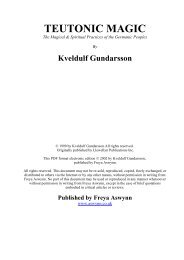TALES FROM THE HINDU DRAMATISTS - Awaken Video
TALES FROM THE HINDU DRAMATISTS - Awaken Video
TALES FROM THE HINDU DRAMATISTS - Awaken Video
You also want an ePaper? Increase the reach of your titles
YUMPU automatically turns print PDFs into web optimized ePapers that Google loves.
VIKRAMORVASI.<br />
The root of all the stories of Pururavas and Urvasi were short<br />
proverbial expressions, of which ancient dialects are so fond.<br />
Thus--'Urvasi loves Pururavas,' meant 'the sun rises'; 'Urvasi sees<br />
Pururavas naked,' meant 'the dawn is gone'; 'Urvasi finds Pururavas<br />
again,' meant 'the sun is setting.'<br />
The same ideas pervade the mythological language of Greece.<br />
BHAVABHUTI.<br />
The name of Bhavabhuti stands high in Sanskrit literature. It is perhaps<br />
the highest in eloquence of expression and sublimity of imagination.<br />
Throughout the whole range of Sanskrit literature--from the simple<br />
lessons of Hitopadesha to the most elaborate polish of Naishadha--from<br />
the terse vigour of Sankaracharjya to the studied majesty of Magha--from<br />
the harmonious grace of Kalidasa to the ornate picturesqueness of<br />
Kadambari, there is probably no writer who can come up to Bhavabhuti in<br />
his wonderful command of Sanskrit language and surprising fluency and<br />
elevation of diction.<br />
The introductions to the Viracharita and the Malati-Madhava tell us that<br />
he belonged to Padmapura in Vidarva (Berar) and was the grandson of<br />
Gopal Bhatta and son of Nilkantha and Jatukarni. He was descended from a<br />
family of Brahmans surnamed Udambaras.<br />
His wonderful memory and vast erudition soon procured for him the title<br />
of Srikantha or Minerva-throated. He soon removed to the court of<br />
Ujjayini, where before the celebrated Mahakala all his plays were acted.<br />
He wrote the Viracharita, the Uttarramacharita and the Malati-Madhava.<br />
According to Rajatarangini, Bhavabhuti was patronized by Yasovarma, king<br />
of Kanoja. This Yasovarma was subdued by Lalitaditya, king of Kasmira,<br />
who acquired by his conquests a paramount supremacy over a large part of<br />
India.<br />
VIRA CHARITA.<br />
The play throws some light on the condition of women. The princesses of<br />
Videha publicly go to the hermitage of Vishvamitra. Sita comes out with<br />
her attendants to dissuade Rama from meeting Jamadagnya and makes a<br />
public entry with him on his return to Ayodhya. The old queens come out<br />
to meet their children. Yet it must not be supposed that Hindu women<br />
enjoyed the same freedom of intercourse as their European sisters. As<br />
now, there used to be separate apartments for women. As now, they were<br />
not admitted to an equality with men. The princesses of Videha do not<br />
carry on conversation with the princes of Ajodhya. Sita does not come<br />
76
















